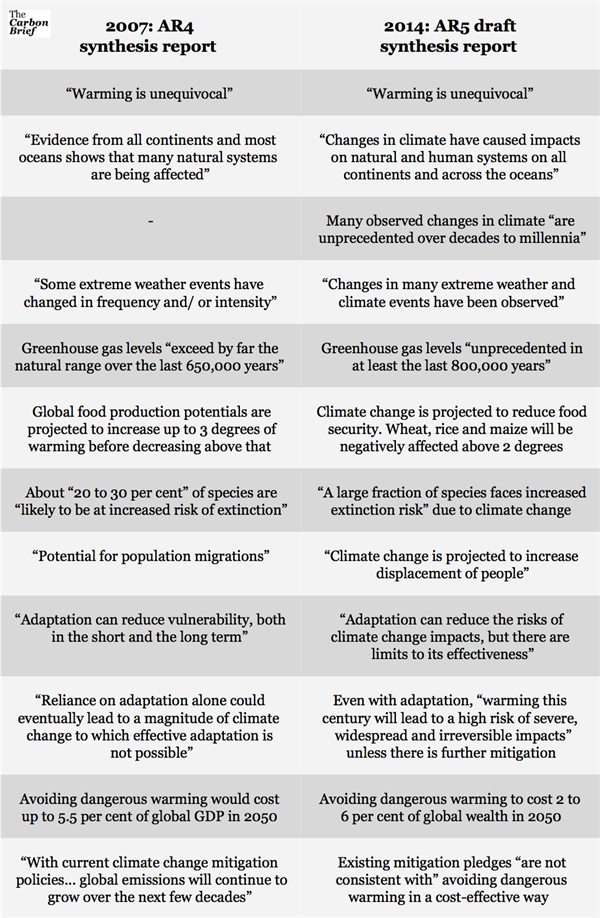The Intergovernmental Panel on Climate Change (IPCC) is sharpening the language of its latest draft synthesis report, seen by Carbon Brief.
Not only is the wording around how the climate is changing more decisive, the evidence the report references is stronger too, when compared to the previous version published in 2007.
The synthesis report, due to be published on 2 November, will wrap up the IPCC’s fifth assessment (AR5) of climate change. It will summarise and draw together the information in IPCC reports on the science of climate change, its impacts and the ways it can be addressed.
We’ve compared a draft of the synthesis report with that published in 2007 to find out how they compare. Here are the key areas of change.
Irreversible impacts are being felt already
The AR5 draft synthesis begins with a decisive statement that human influence on the climate is “clear”, that recent emissions are the highest in history and that “widespread and consequential impacts” are already being felt.
This opening line shows how much has changed in the way the authors present their findings. In contrast, the 2007 report opened with a discussion of scientific progress and an extended paragraph on definitions.
There are also a couple of clear thematic changes in the 2014 draft. The first, repeated frequently throughout, is the idea that climate change impacts are already being felt.
For instance it says that the height of coastal floods has already increased and that climate-change-related risks from weather extremes such as heatwaves and heavy rain are “already moderate”.
These observations are crystallised in a long section on Article 2 of the UN’s climate change convention, which has been signed by every country of the world. Article 2 says that the objective of the convention is to avoid dangerous climate change.
The AR5 draft implies the world may already have failed in this task:
“Depending on value judgements and specific circumstances, currently observed impacts might already be considered dangerous for some communities.”
The second theme is a stronger emphasis on irreversible impacts compared to the 2007 version. The 2014 draft says:
“Continued emission of greenhouse gases will cause further warming and long-lasting changes in all components of the climate system, increasing the likelihood of severe, pervasive and irreversible impacts for people and ecosystems.”
It says that a large fraction of warming will be irreversible for hundreds to thousands of years and that the Greenland ice sheet will be lost when warming reaches between one and four degrees above pre-industrial temperatures. Current warming since pre-industrial times is about 0.8 degrees celsius.
In effect the report has switched tense from future conditional (“could experience”) to present continuous (“are experiencing”). For instance it says there are signs that some corals and Arctic ecosystems “are already experiencing irreversible regime shifts” because of warming.
Stronger evidence than before
As well as these thematic changes in the use of language, the AR5 synthesis comes to stronger conclusions in many other areas.
This is largely because the scientific evidence has solidified in the intervening seven years, the IPCC says.
We’ve drawn together a collection of side-by-side statements so you can see for yourself how the conclusions have changed. Some of the shifts in language are subtle – but they are significant all the same.

Source: IPCC AR4 Synthesis Report, draft AR5 Synthesis Report
Climate alarmism or climate realism?
The authors of the latest synthesis report seem to have made an effort to boost the impact of their words. They’ve used clearer and more direct language along with what appears to be a stronger emphasis on the negative consequences of inaction.
The language around relying on adaptation to climate change has also shifted. It now more clearly emphasises the need for mitigation to cut emissions, if the worst impacts of warming are to be avoided.
Some are bound to read this as an unwelcome excursion into advocacy. But others will insist it is simply a case of better presenting the evidence that was already there, along with advances in scientific knowledge.
Government representatives have the chance to go over the draft AR5 synthesis report with a fine toothcomb when they meet during 27-31 October.
Will certain countries try to tone down the wording, as they have been accused of doing in the past? Or will the new, more incisive language make the final cut?
To find out, tune in on 2 November when the final synthesis report will be published.

